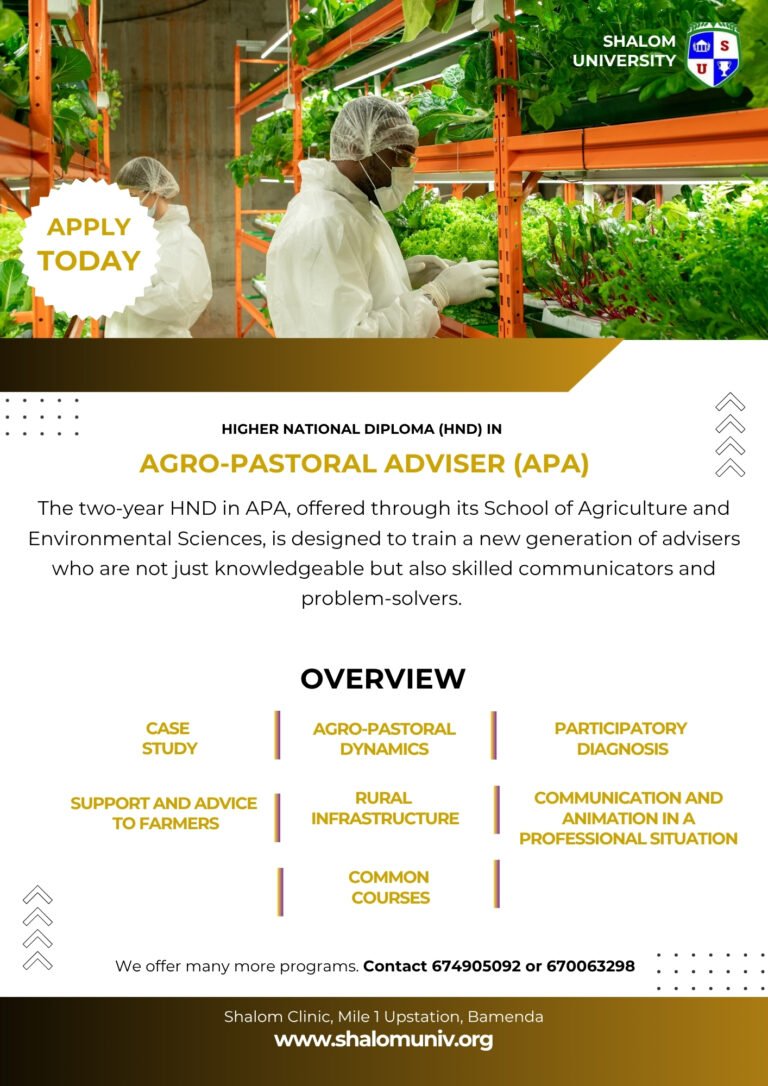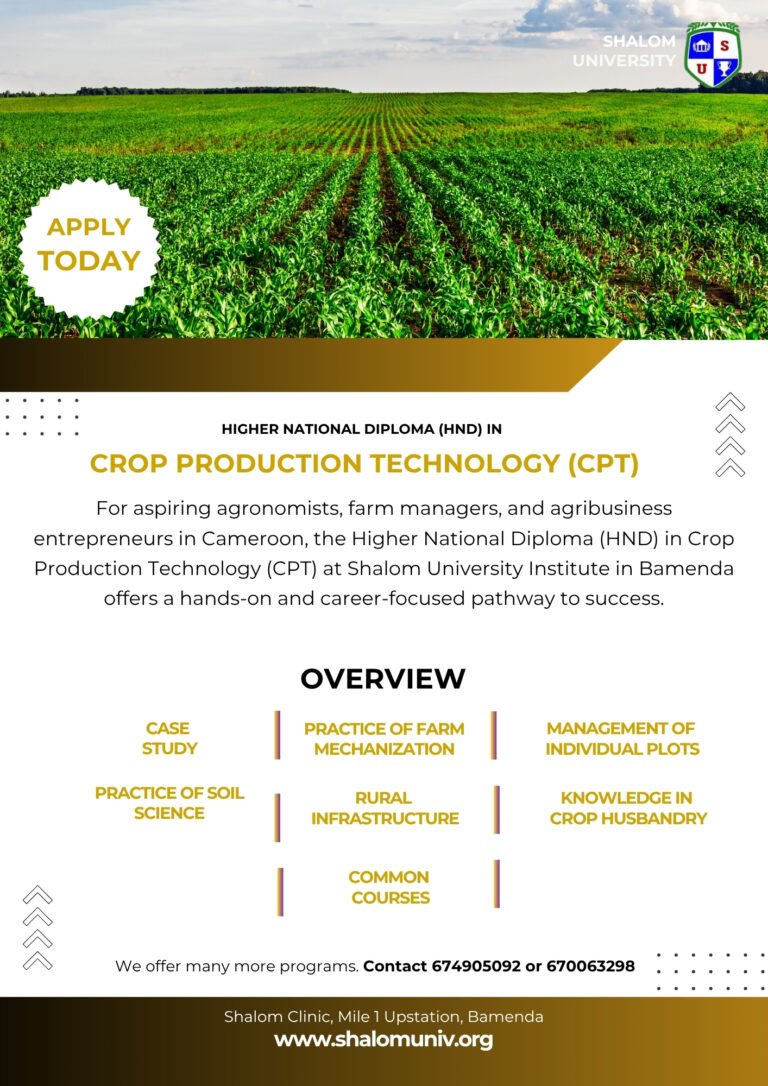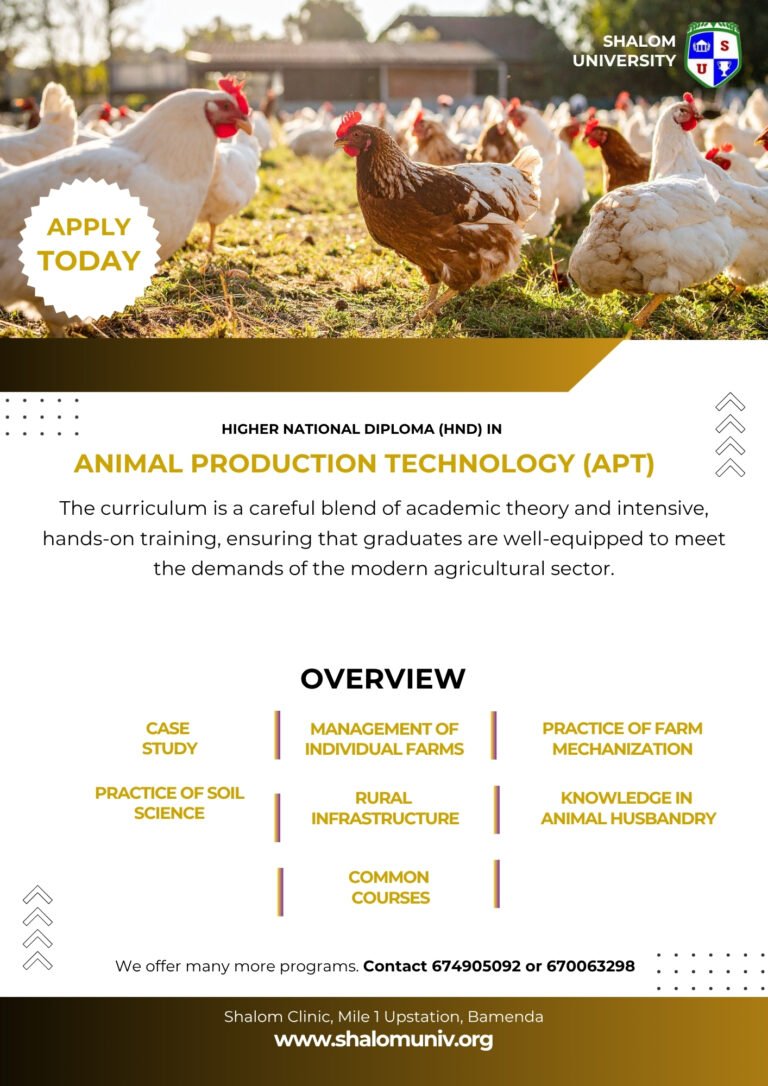In Cameroon, where agriculture and livestock farming are the cornerstones of the economy, the transition from subsistence farming to commercial, profitable agribusiness is a key driver of economic growth. This shift requires a new breed of professionals who are not only skilled in crop and animal production but are also savvy entrepreneurs capable of managing viable agro-pastoral ventures. The HND in Agropastoral Entrepreneurship (AGE) at Shalom University in Bamenda is specifically designed to train these essential business-minded farmers. This program provides aspiring agro-entrepreneurs with the practical skills, business acumen, and contextual understanding needed to excel in Cameroon’s diverse agro-pastoral landscape.
The curriculum at Shalom University is tailored to the Cameroonian context, blending foundational science with hands-on training in business management, economics, accounting, and legal frameworks related to agriculture. Graduates are prepared not only to manage successful agro-enterprises but also to create jobs, innovate business models, and contribute to the modernization of Cameroon’s agricultural sector.
The AGE Curriculum at Shalom University
The HND in Agropastoral Entrepreneurship program at Shalom University is structured around a set of core papers that provide a comprehensive and practical education in the field.
Paper: Case Study
The Case Study paper is a vital component that integrates all the theoretical knowledge and practical skills gained throughout the program. It challenges students to analyze complex business scenarios within the agro-pastoral sector, from developing a business plan for a new dairy farm to managing a marketing campaign for a fruit processing business. This is particularly relevant for agro-entrepreneurs in Cameroon, who must navigate local market dynamics, funding challenges, and regulatory hurdles.
The course trains students to:
- Analyze real-world business challenges: Based on a given case, students evaluate operational bottlenecks, market entry strategies, or financial management issues faced by an agro-enterprise in Cameroon.
- Identify critical issues and underlying causes: They pinpoint specific problems related to business planning, market access, financial viability, or legal compliance.
- Propose evidence-based solutions: Students formulate practical recommendations based on business principles, agro-pastoral economics, and legal frameworks. For example, a case study might involve a farmer cooperative struggling to scale up production and propose a new business strategy, including a financial plan and market analysis.
- Defend their decisions: During formal presentations, students must justify their analysis and proposed solutions, demonstrating their critical thinking and communication skills, which are essential for securing funding, attracting partners, and managing a successful business.
Paper: Practice of Agropastoral Entrepreneurship
This paper focuses on the hands-on, practical application of entrepreneurial principles in the agro-pastoral sector. It provides students with the essential skills and tools needed to launch and manage their own agro-enterprises effectively.
Key topics include:
- Business Plan Development: The process of creating a comprehensive business plan, from market research to financial projections, specifically for agro-pastoral ventures in Cameroon.
- Innovation and Product Development: Techniques for developing new and value-added agro-pastoral products, considering local resources and market demand.
- Marketing and Sales: Strategies for marketing and selling agro-pastoral products, including branding, pricing, and distribution channels.
- Operational Management: Hands-on training in managing the day-to-day operations of an agro-enterprise, including production scheduling, quality control, and inventory management.
Paper: Agricultural Land Tenure Systems and Job Search and Securisation
This paper addresses two critical areas for agro-entrepreneurs in Cameroon: understanding the legal and social aspects of land ownership and developing skills for career advancement. Navigating land tenure systems is often a significant challenge for new entrepreneurs in the agricultural sector.
The curriculum covers:
- Land Tenure Systems in Cameroon: A detailed study of the legal and customary land tenure systems in Cameroon and their implications for farming and pastoralism.
- Land Acquisition and Securitization: The process of acquiring land, securing titles, and resolving land-related disputes.
- Job Creation and Securitisation: Skills for creating employment opportunities within agro-enterprises and ensuring the security and well-being of employees.
- Career Development: Skills for managing a career in the agro-pastoral sector, including networking, professional development, and identifying new business opportunities.
Paper: Agropastoral Economics
This paper provides students with a foundational understanding of economic principles and how they apply to agro-pastoral systems. Understanding the economics of farming and herding is crucial for making sound business decisions and ensuring profitability.
The curriculum covers:
- Farm Management Economics: Principles of farm management, including resource allocation, cost analysis, and profitability.
- Market Analysis: Techniques for analyzing market trends, consumer demand, and competitive landscapes for agro-pastoral products.
- Value Chain Analysis: Understanding the different actors in the agro-pastoral value chain and how to capture more value for one’s own enterprise.
- Rural Development Economics: An introduction to the broader economic issues affecting rural development in Cameroon, including access to credit and infrastructure.
Paper: Agropastoral Accounting
This paper provides students with the basic accounting skills needed to manage the finances of their agro-pastoral enterprises effectively. Financial record-keeping and management are essential for making informed business decisions, securing credit, and ensuring profitability.
The curriculum covers:
- Farm Record-Keeping: Designing and using simple record-keeping systems for tracking production, sales, and expenses.
- Financial Statements: Introduction to basic financial statements, such as income statements and cash flow statements, relevant to agro-pastoral enterprises.
- Budgeting: Developing and using budgets as tools for planning and controlling farm finances.
- Financial Reporting: Communicating financial information clearly and accurately to investors, bankers, and partners.
Paper: Basic Sciences (AGE, AGP)
This paper provides students with a foundational understanding of the biological and physical sciences that underpin agriculture and animal production. It covers topics common to both agriculture and animal production programs, ensuring a solid scientific base.
The curriculum covers:
- Soil Science: Basic principles of soil composition, fertility, and management.
- Plant Science: Basic principles of plant biology, crop growth, and pest and disease management.
- Animal Science: Basic principles of animal biology, nutrition, health, and reproduction.
- Ecology: Understanding the ecological principles relevant to agro-pastoral systems.
Catalyzing Entrepreneurial Growth
Graduates of the HND in Agropastoral Entrepreneurship from Shalom University are well-prepared to launch and manage their own agro-pastoral enterprises in Cameroon. They can find opportunities as farm managers, agribusiness consultants, or value-added food processors, contributing significantly to the nation’s economic growth and food security. Their proficiency in business planning, market analysis, financial management, and practical agro-pastoral skills, coupled with an understanding of the local context, makes them uniquely qualified to succeed. The Case Study paper ensures that they are not just technically skilled but also adept at applying their knowledge to solve real-world business challenges. By providing a comprehensive and contextually relevant education, Shalom University plays a significant role in nurturing the entrepreneurial expertise crucial for modernizing Cameroon’s agricultural sector and building a more prosperous rural economy.




